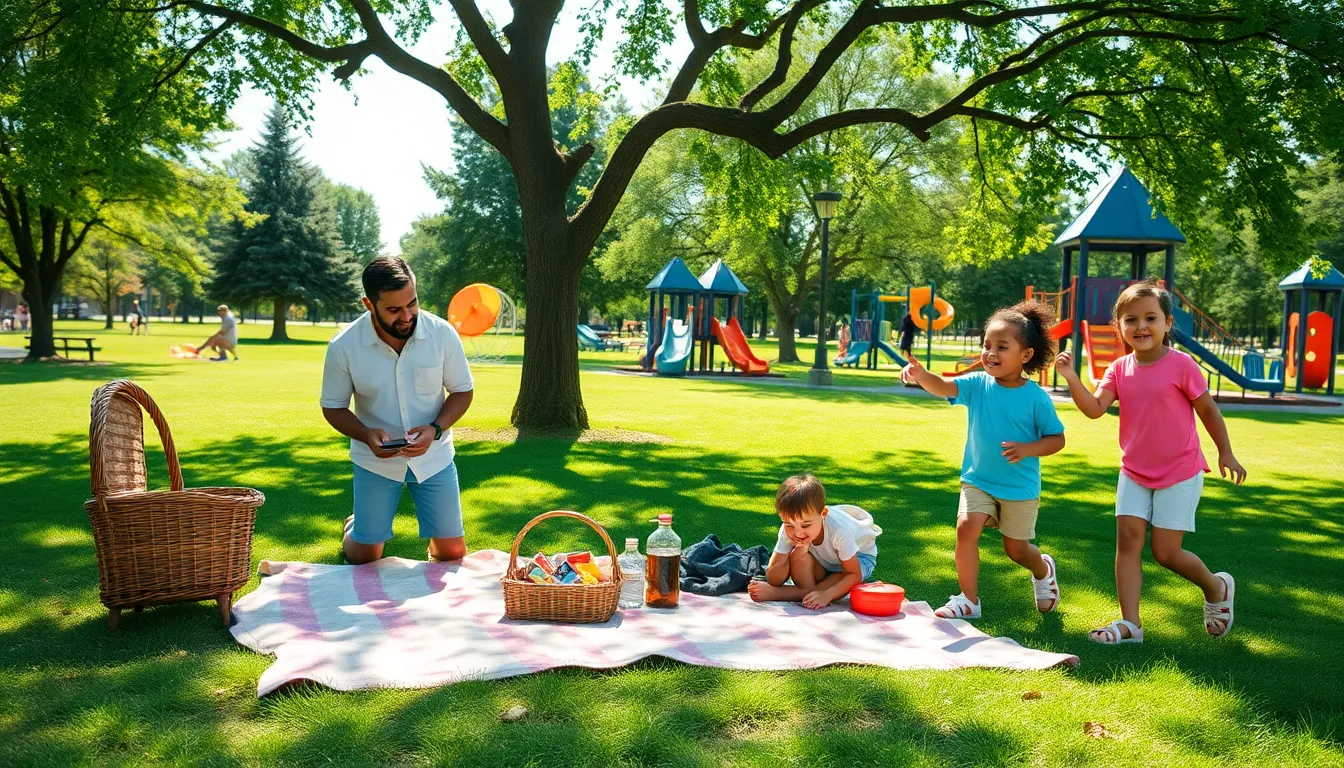Music has a magical way of bringing people together, and when combined with play, it creates unforgettable family moments. Musical games offer a fun and interactive way for families to bond while nurturing creativity and rhythm. Whether it’s a lively game of musical chairs or a sing-along session, these activities can spark joy and laughter in any household.
In today’s fast-paced world, finding time for family fun can be a challenge. That’s where musical games shine. They provide an engaging outlet for all ages, making it easy to connect through the universal language of music. From toddlers to grandparents, everyone can join in the rhythm and create lasting memories together.
Table of Contents
ToggleOverview of Musical Games for Families
Musical games serve as effective tools for building family connections. These activities engage participants of all ages, creating an inclusive environment where everyone can participate and enjoy. Popular examples include:
- Musical Chairs: This classic game encourages movement, rhythm, and quick reflexes. Players walk around chairs while music plays and must find a seat when the music stops, fostering excitement and laughter.
- Sing-Alongs: Families come together to sing favorite songs. Participants can use instruments or simply sing out loud, promoting creativity and shared experiences.
- Freeze Dance: Participants dance freely until the music stops. When it stops, they must freeze in their current position, enhancing coordination and spontaneity.
- Rhythm Games: Using percussion instruments, families can create beats and rhythms together. This activity emphasizes teamwork and musicality while allowing for individual expression.
- Name That Tune: Family members guess songs based on short clips. This engaging activity encourages active listening and musical knowledge, resulting in friendly competition.
Incorporating these musical games into family gatherings or casual evenings fosters enjoyment and strengthens relationships. They create memorable experiences, turning everyday moments into celebrations of togetherness.
Types of Musical Games

Musical games encompass a variety of forms, ranging from traditional to modern, each offering unique experiences for families. These types provide opportunities for connection through rhythm and melody.
Traditional Musical Games
Traditional musical games often rely on familiar formats that promote interaction and engagement. Key examples include:
- Musical Chairs: Participants walk around a circle of chairs while music plays. When the music stops, everyone rushes to find a chair. One chair is always removed after each round, creating excitement and laughter.
- Simon Says: A classic game where one person (Simon) gives commands, often involving musical elements, like jumping to the beat of a song. Players must follow instructions only when prefaced with “Simon says.”
- Freeze Dance: Families dance while music plays, freezing in place when it stops. This game promotes movement and spontaneity, making it enjoyable for all ages.
- Pass the Parcel: Participants sit in a circle and pass a wrapped item while music plays. When the music halts, the receiver unwraps a layer, often revealing small prizes or challenges.
Modern Musical Games
Modern musical games incorporate technology and innovation, appealing to today’s families. Noteworthy examples include:
- Karaoke: Players sing along to their favorite tracks, using lyrics displayed on a screen. This game cultivates confidence and creative expression in a fun environment.
- Dance Dance Revolution: A video game that combines dance and rhythm. Players step on directional arrows in time with the music, enhancing coordination and physical fitness.
- Rhythm Evolved Apps: Mobile applications allow families to participate in rhythm-based challenges. These digital games promote interaction through competitiveness and collaboration.
- Name That Tune: Players listen to snippets of songs and guess their titles. This game encourages active listening and can be adapted to various musical genres.
Engaging in these traditional and modern musical games bolsters family connections while creating lively and memorable experiences.
Benefits of Playing Musical Games
Musical games offer numerous benefits for families, promoting connection and skill development while creating joyful experiences. Engaging in these activities fosters a sense of belonging and encourages personal growth.
Enhancing Family Bonding
Musical games strengthen family bonds through shared experiences. Participants collaborate, communicate, and celebrate together. These activities help reduce stress and create a lively atmosphere where family members of all ages feel included. Regular engagement in musical games fosters ongoing family traditions and enhances emotional connections, as laughter and teamwork contribute to cherished memories.
Developing Musical Skills
Musical games cultivate essential musical skills, such as rhythm, pitch recognition, and melody recall. Players practice listening skills by identifying tunes and beats, which may enhance cognitive abilities. Participation in rhythm-based games promotes coordination and timing, while sing-alongs facilitate vocal skills and expression. Families nurture a love for music and creativity, laying the foundation for future musical exploration and appreciation.
Popular Musical Games for Families
Musical games provide an engaging way for families to bond while enjoying music together. These games vary in structure and appeal, offering something for every family member.
Game 1: Musical Chairs
Musical Chairs is a classic game that combines music and quick reflexes. Players arrange chairs in a circle, with one fewer chair than the number of participants. As music plays, participants walk around the chairs. When the music stops, everyone races to sit in a chair. The player left standing is eliminated, and one chair is removed for the next round. This game promotes physical activity and encourages friendly competition among family members.
Game 2: Sing-Alongs
Sing-Alongs create an inviting atmosphere where families can share their favorite songs. Participants gather, choosing a specific theme or genre, and take turns singing. Lyrics can be printed out or displayed on a screen for easy following. This activity fosters collaboration, enhances vocal skills, and celebrates shared musical interests. Sing-Alongs strengthen family bonds as members cheer each other on and reminisce about cherished melodies.
Tips for Choosing the Right Musical Game
Choosing the right musical game involves several key considerations that can maximize family enjoyment and engagement.
- Identify Age Range: Select games suitable for all ages. Games like Freeze Dance work for younger children, while more complex word games can engage older family members.
- Consider Group Size: Match the game to the number of players. Games such as Musical Chairs thrive in larger groups, while party games may accommodate smaller family gatherings.
- Evaluate Interests: Focus on family members’ musical preferences. Opt for sing-alongs featuring favorite songs or rhythm games that align with their tastes.
- Assess Physical Activity Levels: Choose games that fit the family’s activity level. For energetic families, Dance Dance Revolution may be ideal, while calmer options like sing-alongs suit more relaxed settings.
- Prioritize Inclusivity: Select games that allow everyone to participate, ensuring no one feels left out. Games like Name That Tune foster collective enjoyment through shared knowledge.
- Adaptability: Look for games that offer flexibility. Some games can be easily modified to increase difficulty, making them enjoyable for various skill levels.
- Time Commitment: Determine how much time families can dedicate to play. Shorter games like Simon Says can fit into busy schedules, while longer sessions may promote deeper interaction with rhythm-based games.
By focusing on these factors, families can find the perfect musical game to enhance their connections and create memorable moments together.
Musical games offer families a unique opportunity to bond while enjoying the universal language of music. By incorporating these activities into family time, they can create joyful moments that strengthen relationships and foster a sense of togetherness. Whether it’s a lively round of Musical Chairs or a heartfelt Sing-Along, these games cater to various interests and age groups.
As families explore both traditional and modern musical games, they not only enhance their connections but also cultivate essential skills and creativity. With thoughtful consideration of the participants’ needs and preferences, families can easily find the perfect game to make lasting memories. Embracing the power of music through these engaging activities can transform ordinary gatherings into extraordinary celebrations of love and unity.








